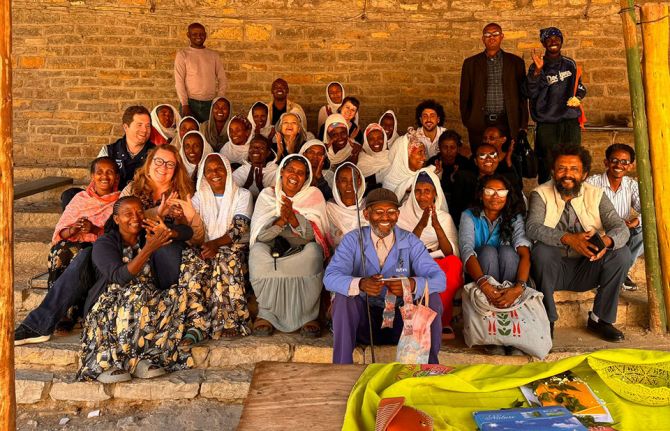
Feature Story
Emerging from conflict: women’s role in rebuilding better, fairer communities
20 October 2010
20 October 2010 20 October 2010
Women clearing rubble from the streets of Port-au-Prince, Haiti. Credit: UN Photo/Sophia Paris
Too often women suffer the worst consequences of war. In certain parts of the world gender-based and sexual violence are increasingly used as a weapon of conflict and are a prevalent characteristic of numerous humanitarian crises. The latest flagship report from the United Nations Population Fund (UNFPA), State of world population 2010, explores the dangerous consequences for women caught in conflict and crisis who are left vulnerable to HIV infection, disabilities, social stigma and psychological trauma.
The publication of the report, which also highlights many positive actions by individuals, civil society and governments to confront this issue, coincides with the tenth anniversary of Resolution 1325 on Women, Peace and Security. The resolution is the United Nation’s Security Council’s challenge to the abuse of women in conflict and their marginalisation in the peace building process.
Subtitled From conflict and crisis to renewal: generations of change, the report examines developments in the 10 years since this key resolution. The report is based on stories from the field in a range of countries that have experienced turmoil and are now on the sometimes rocky road to recovery: Bosnia and Herzegovina, Liberia, Timor-Leste and Uganda.
HIV in crisis situations
The impact of HIV in crisis situations is also explored. Sexual violence makes women vulnerable to HIV infection. The social instability, poverty and powerlessness that often accompany social upheaval and displacement also facilitates HIV transmission with weakening of norms regulating sexual behaviour.
Countries should not just be rebuilt, but built back better and renewed, with women and men on equal footing, with rights and opportunities for all.
Thoraya Ahmed Obaid, UNFPA’s Executive Director
The report shows how women and young people have overcome difficulties and started to rebuild their lives and their communities. In post-conflict northern Uganda, where a rebel war raged for more than 20 years, young people are working with the local branch of Straight Talk Foundation, a national NGO, which has set up the Gulu Youth Centre. It is now a major provider of sexual and reproductive health care for youth in the area, including HIV counselling and testing. This is a much-needed service for the region's young women as older teenage girls are much more likely to be living with HIV.
Women and men together for peace
There is also recognition that men play a vital role in bringing about positive change. Male traditional leaders in Africa and the Asia-Pacific region are now taking women’s rights and needs into account in decision-making.
Increasingly, women are also elected as local leaders on their own steam and take active part in re-building society in post-conflict situations. For example in Burundi and Nepal, two conflict affected countries, women in civil society have been heralded for their efforts and impact throughout the peace process.
According to the State of world population, concerned people at all levels are searching for ways to build new and healthy societies where women and girls—and men and boys—can flourish.
As Thoraya Ahmed Obaid, UNFPA’s Executive Director, said about the report, “Countries should not just be rebuilt, but built back better and renewed, with women and men on equal footing, with rights and opportunities for all.”



